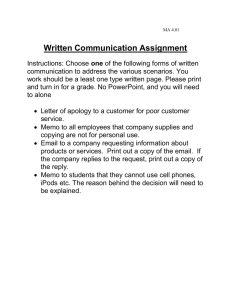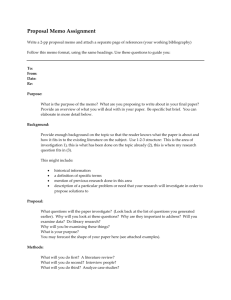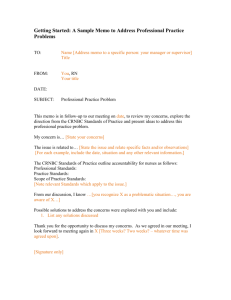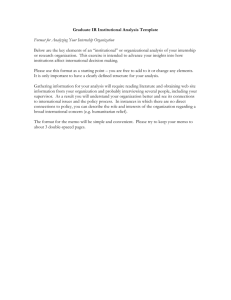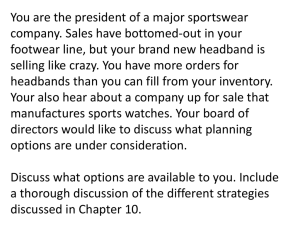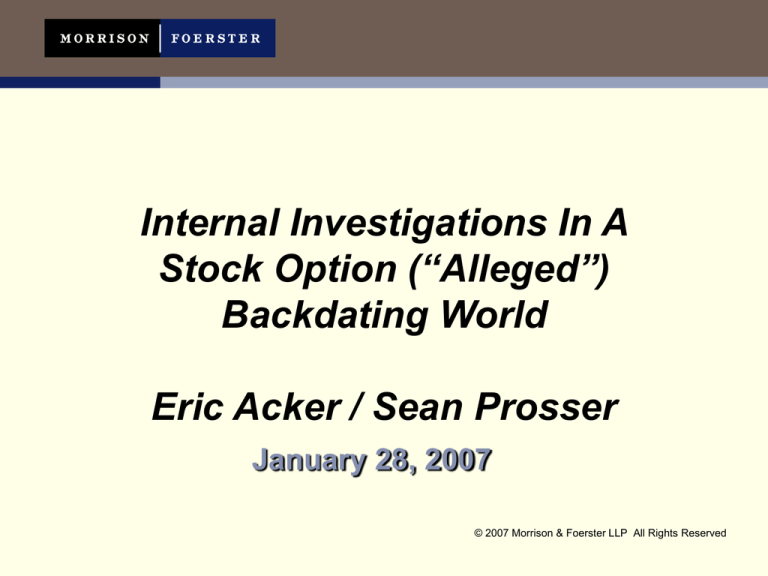
Internal Investigations In A
Stock Option (“Alleged”)
Backdating World
Eric Acker / Sean Prosser
January 28, 2007
© 2007 Morrison & Foerster LLP All Rights Reserved
What is an internal investigation?
• Investigation conducted into acts or omissions
that create potential liability for a company
• Examples:
• Accounting fraud
• Options back-dating
• How do companies learn of issues?
• SEC or other regulators
• Auditors
• Whistleblowers
What Is Investigated?
• Investigation may seek to determine:
•
•
•
•
•
•
Whether misconduct occurred
The nature and scope of the misconduct
Who is involved
Who is responsible
Why the misconduct occurred
How widespread the problem is
What Is Investigated?
• Also investigate need for remedial actions:
• What remedial steps should be taken to insure
conduct does not recur?
• Are disciplinary actions necessary or appropriate
(including terminations)?
• How can the company remedy damage or redress
injuries?
• Is there a sufficiently robust corporate compliance
program?
Why Do an Internal Investigation?
• To understand why acts/omissions
occurred and prevent future occurrences
• To develop appropriate response to
possible charges of wrongdoing
• To obtain more lenient treatment from
SEC regulators/prosecutors
• Thompson/McNulty/Seaboard
Thompson Memo
• In 2003, Deputy Attorney General
Thompson issued a memo identifying
factors for prosecutors to consider in
deciding whether and how vigorously to
prosecute corporations
• Factors were taken largely from 1999
memo issued by then Deputy AG Eric
Holder, but Thompson Memo made
consideration of factors mandatory
Thompson Memo
• Thompson Memo “increased [the] emphasis on
and scrutiny of the authenticity of a corporation’s
cooperation.”
• Factors considered in determining adequacy of
cooperation (factor no. 4):
• Voluntary disclosure of wrongdoing
• Waiver of attorney-client and work product
protections
• Advancement of legal fees to represent
employees
McNulty Memo
• In December, current Deputy Attorney General Paul
McNulty issued his own memo superseding Thompson’s.
• Memo maintains emphasis on importance of internal
investigations:
“[T]he Department, in conjunction with regulatory
agencies and other executive branch departments,
encourages corporations, as part of their compliance
programs, to conduct internal investigations and to
disclose their findings to the appropriate authorities.”
McNulty Memo
• Two key changes from Thompson Memo:
• Prosecutors may request privilege waivers
only in limited circumstances
• Company’s advancement of legal fees for
employees should not be considered
McNulty Memo – Why the Change?
•
•
Thompson Memo’s policy regarding privilege waiver
came under strong criticism from business and legal
groups.
• Companies felt pressure to reflexively waive
privileges.
• Prosecutors regularly requested privilege be waived.
Privilege waiver matters because:
• There are legitimate reasons for protecting privileges.
• Waiver with respect to the government often means
waiver as to others, including civil litigants and class
action plaintiffs.
McNulty Memo – Why the Change?
• SDNY’s recent decision in U.S. v. Stein held that
Thompson memo’s suggestion that companies
should not agree to pay employees’ legal fees
constituted an unconstitutional threat.
• Introduction of the Attorney Client Privilege
Protection Act of 2006 by Senator Arlen Specter,
which had support by business and legal
groups.
Proposed Changes to Federal Rules of
Evidence Regarding Privilege
• Proposed to address effect of disclosure of privileged
material in light of costs of reviewing the volume of
information now being produced in litigation and to
encourage cooperation with government investigations.
• Inadvertent disclosure does not operate as waiver if reasonable
steps were taken to prevent disclosure.
• Disclosure to federal office or agency does not operate as a
waiver in favor of private individuals or entities.
• Potential impact on internal investigations:
• Companies may be more likely to undertake them.
• Investigations may be less likely to lead to civil litigation.
When To Do an Internal Investigation
• Before an investigation by regulators/
prosecutors
• While a government investigation is “on hold”
pending the outcome of the internal investigation
• Concrurrent with a government investigation
What Happens in an Internal Investigation?
• Document collection and review
• Witness interviews
• Analysis
• Drafting of the report (not always)
Document Collection
• Gather hard documents from employees/company
• Review and collection may be performed by company
employees or lawyers depending on concerns over:
• Cost
• Intrusiveness
• Thoroughness
• Collection of electronic documents
• Should usually be performed with a vendor
• Usually filtered by search terms
The Report
• To Write or Not to Write
• Report may include:
• Factual findings
• Legal conclusions
• Recommended remedial actions
Ethical Considerations: Who Is the Client?
• Who retains the firm: the Company, the Board of
Directors, the Audit Committee or a special
committee of the Board of Directors
• Independence of investigation may be compromised
where the company is the client
• Can limit scope of investigation
• Desire to please client could affect findings
• Upper management or inside directors may be implicated
• Preferred client: Audit or Special Committee
Risks of Multiple Representation
• Results of representing individuals and
Committee of Board:
• Conflict may arise later
• Loss of credibility with investigating agency
• Complications in the attorney’s ability to report
findings because of attorney-client privilege
The Investigators
• Hiring long-standing outside counsel poses
independence concerns
• Rely on repeat business from company
• Have relationships with individuals at company
• Enron/Vinson & Elkins
• Advantages of hiring long-standing counsel
• Less of a learning curve
• Expertise in relevant area
Scope of Investigation
• Subject matter
• Preferably, no limit on subject matter
• May include investigation of compliance
culture
• Time constraints
• May be imposed by government
• To meet reporting deadlines
• Business reasons
Providing Employees with Counsel
• Witness is better prepared, may have
recollection refreshed
• Counsel can stress importance of being truthful
• Fairness to employees is a proper corporate
concern
• Single firm can often represent multiple
employees
Providing Documents in Advance
• Advantages
• Interview takes less time
• Witness is better prepared
• May be less inclined to lie
• Disadvantages
• No “gotcha”
• Confidentiality concerns
Benefits of Internal Investigations
• Reduces exposure to government action
• Puts company in better position to respond to
charges/lawsuits
• Prevents future wrongdoing
• Provides information that management needs to
fulfill responsibilities and improve corporate
compliance

